Arrive at Jomo Kenyatta International Airport in Nairobi on flight LX 294 (Swiss air 9764)at 18h40 and after clearing with Immigration and Customs formalities, proceed to the international arrivals area, where you will be met by our representative and transferred to Hemingways Nairobi.
The City of Nairobi is one of the engines driving the rise of the African continent. It is also the only capital city in the world that includes a game reserve, which the locals are very proud of. Most Nairobians speak Swahili with an urban slang (Sheng’) and English. The most common greeting to visitors is ‘Jambo’ which means ‘Hello’. Nairobi is known for its buzzing nightlife, and no matter where you are in the city, you will be entertained with music and beautiful people.
There are many interesting places to visit in and around Nairobi, particularly in respect to conservation, and these have been included in your safari itinerary.
Overnight: Hemingways Nairobi
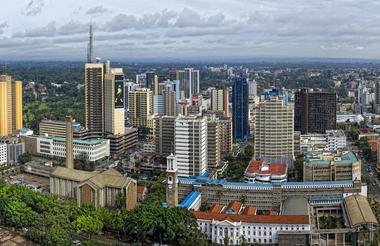

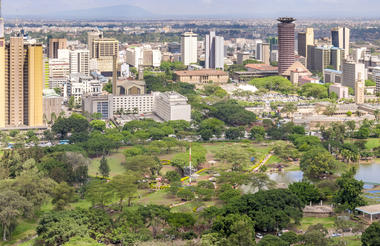
Transfer
Accommodation
Dinner
Spend the day at leisure and enjoy the hotel facilities offered.
Lunch on own arrangement. Dinner at the hotel.
Overnight: Hemingways
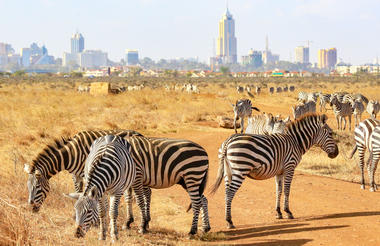
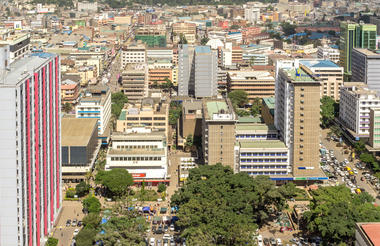
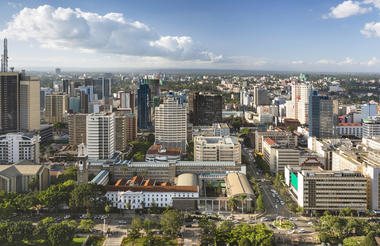
Day of leisure in Nairobi
Accommodation
Breakfast
After breakfast at the hotel, depart for a days excursion in the beautiful Karen area.
Begin with a visit to the Giraffe Centre which offers the unique experience of hand-feeding these gentle giants at eye level from a raised platform, while watching the warthogs below snuffle around looking for tidbits. The center is the headquarters of the African Fund for Endangered Wildlife (AFEW), which was set up to raise money to relocate the endangered Rothschild giraffe to safe as.
After visiting the Giraffe Centre, depart for the morning public visit (11h00) to the David Sheldrick Wildlife Trust's Elephant Orphanage for your first meeting with the orphaned elephants. Here you will be able to interact with the young elephants and talk to their keepers to learn more about this worthwhile project and the importance of the elephant in Africa’s conservation efforts. The David Sheldrick Wildlife Trust is dedicated to the protection of Africa’s wildlife. Here, orphaned animals, particularly elephant and sometimes rhino, are hand-raised with the intention of reintroducing them back into the wild. See the playful orphans as they come in to be fed and one of the keepers will narrate the story behind each orphan.
Experience a delightful lunch at the Talisman, a popular restaurant in Nairobi that serves up a delicious fusion of European, Pan-Asian and African cuisines. The deco features carved wooden pillars from Pakistan, elegant Afghan rugs, charming fireplaces a sprawling terrace and a beautiful garden.
After lunch visit the Ocean Sole Foundation’s shop. Passionate about the ocean, its ecosystems and marine wildlife, Ocean Sole recycle flip-flops that are found littered on beaches and in the waterways of Kenya. As a bizarre and yet very real phenomenon, thousands of flip-flops are washed up onto the East African coast creating an environmental disaster. The discarded flip-flops are transformed into elephant, giraffe, lion, rhino, dolphin and other attractive pieces and each piece comes with an important message about marine conservation.
Then visit Kazuri Beads which was started to help women around Nairobi with regular employment so that they could support their families and educate their children. Meet the women and chat with them about their lives as they work. The jewelry also makes great gifts!
Later return to the David Sheldrick Wildlife Trust’s elephant orphanage for a private visit (15.00 hours). Here you will be able to interact with the young elephants and talk to their keepers to learn more about this worthwhile project and the importance of the elephant in Africa’s conservation efforts.
The David Sheldrick Wildlife Trust’s elephant Orphanage is a small charity, established in 1977 by Dr. Dame Daphne Sheldrick to honour the memory of her husband, famous Naturalist, David Sheldrick, the founder Warden of Tsavo East National Park in Kenya. For over 25 years Kenya born Daphne lived and worked alongside her late husband and during that time she raised and rehabilitated back into the wild orphans of misfortune from many different wild species, including elephants aged two and upwards. She is a recognised International authority on the rearing of wild creatures and is the first person to have perfected the milk formula and necessary husbandry for both infant milk dependent elephants and rhinos. For her work in this field Daphne has received several prestigious awards.
The elephant orphans raised by the Trust are gradually rehabilitated back into the wild elephant community of Tsavo National Park when grown, a transition that is made at their own pace and in their own time, but usually taking approximately eight to ten years. A number of ex-Nursery orphans have now had young born in the wild. Adopting one of these special animals gives it a second chance at living freely in the wild.
After the visit, return to Hemingways
Overnight: Hemingways



Breakfast, lunch & dinner
Transfers
Visit to Giraffe Center
Visit to David Sheldrick Wildlife Trust elephant orphanage x 2
Visit to Kazuri Beads
After breakfast, you will be collected at Hemingways and be transferred by road to the Amboseli National Park, arriving at the Tawi Lodge in time for lunch. Drive time approximately 4 hours.
Tawi Lodge is located in a private conservancy of 6,000 acres, just five minutes from the eastern entrance to Amboseli National Park. The lodge offers stylish accommodation and each cottage has its own wooden-deck veranda with views of Mt. Kilimanjaro, en-suite bathrooms fitted with both a bath and shower, fireplace and a mini bar.
After lunch enjoy your afternoon game drive in the park.
Overnight: Tawi Lodge
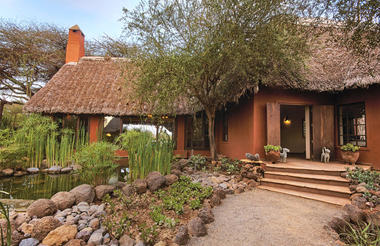
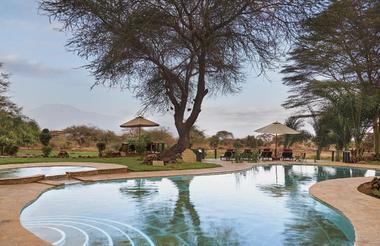
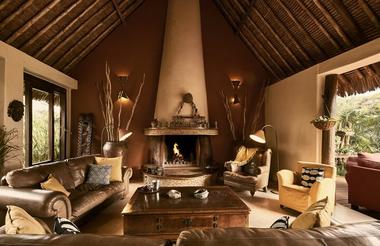
Breakfast at Hemingways
Transfer by road
English speaking driver guide
Accommodation
Lunch and dinner at Tawi Lodge
Set off with your driver guide after breakdfast on an extended game viewing drive and exploration of Amboseli National Park.
Amboseli lies at the foot of Africa’s highest mountain, Mt. Kilimanjaro (19,340ft). The mountain dominates every aspect of the park and you can get the best views of its snow capped peak from Amboseli. The parks fragile ecosystem supports a variety of game and is famous for its large herds of elephant. Swamps and springs, fed by underground rivers from Kilimanjaro’s melting snow, offer a watering place for the wildlife and birds during the dry season.
Return to the lodge for lunch and a late afternoon guided nature walk.
Note: Your driver guide will depart in the afternoon and drive to Nairobi, and meet you on arrival at Wilson Airport the following day.
We need to ask: Why is it that most people feel such empathy for Elephants, even if they have never had close contact with them?
Is it because of their size, their quaint characteristics, or the the fact that they are so incredibly endearing as babies, tripping over little wobbly trunks that seem to serve no useful purpose other than get in the way? Or is it, perhaps, because Elephants are "human" animals, encompassed by an invisible aura that reaches deep into the human soul in a mysterious and mystifying way.
Of course, elephants share with us humans many traits - the same span of life, (three score years and ten, all being well) and they develop at a parallel pace so that at any given age a baby elephant duplicates its human counterpart, reaching adulthood at the age of twenty. Elephants also display many of the attributes of humans as well as some of the failings. They share with us a strong sense of family and death and they feel many of the same emotions. Each one is, of course, like us, a unique individual with its own unique personality. They can be happy or sad, volatile or placid. They display envy, jealousy, throw tantrums and are fiercely competitive, and they can develop hangups which are reflected in behaviour. They also have many additional attributes we humans lack; incredible long range infra sound, communicating in voices we never hear, such sophisticated hearing that even a footfall is heard far away, and, of course they have a memory that far surpasses ours and spans a lifetime. They grieve deeply for lost loved ones, even shedding tears and suffering depression. They have a sense of compassion that projects beyond their own kind and sometimes extends to others in distress. They help one another in adversity, miss an absent loved one, and when you know them really well, you can see that they even smile when having fun and are happy.
Theirs, and all wildlife preservation, must be our priority. Courtesy Daphne Sheldrick
Overnight: Tawi Lodge


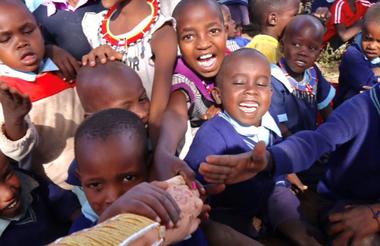
Game drive
Nature Walk
Accommodation
All meals and soft drinks, local beers and house wines
Game drives
English speaking driver guide
Guided nature walk
After breakfast you will be transferred in the lodge vehicle to Amboseli airstrip for your scheduled flight to Wilsons Airport Nairobi. Flight departure time 08h15 and arrival at 08h50. On arrival you will be met by our professional driver guide and continue your drive through rich agricultural land towards Mount Kenya. Pass the equator and then continue your journey to the private Ol Pejeta Conservancy, arriving at Sweetwaters Serena Camp in time for lunch.
Sweetwaters Serena Camp is located in the private Ol Pejeta Conservancy, renowned for its rhino conservation success. The camp is built around a waterhole which attracts a wide variety of game during the day and night. The main area was once a colonial farm and the restaurant is housed in the former manager's house along with a Bar and lounge with cozy log fire and a swimming pool nearby.
You will be accommodated in the the new “Morani Wing” which has eleven spacious and tastefully furnished tents, all with views of the watering hole. The Morani Wing has been named in honor of Morani, the first black rhino to be introduced to Sweetwaters Game Reserve (now Ol Pejeta Conservancy), which was opened as a Black Rhino Sanctuary in 1989. An orphan of poaching, Morani was tamed and before his death in 2008, he was the best Ambassador for all black rhino in Africa.
Spend some time relaxing after lunch, before your late afternoon game drive in the conservancy.
The game drive starts at 16.00 hours and you will visit the Northern White Rhinos at Ol Pejeta. There are only three left on the planet, and Ol Pejeta is home to all of them. Najin, Fatu and Sudan, the last northern white rhinos left in the world were moved to Kenya from the Czech Republic in 2009. Ol Pejeta, being one of East Africa’s largest Black rhino sanctuaries, with well qualified and experienced staff to care for these species, was assessed to be the best possible location for this breeding project. The rhino were translocated from Dvur Kralove Zoo in the Czech Republic, which up until late 2009, had been their home. The transfer was aimed at providing the rhinos with the most favorable breeding conditions, in an attempt to pull the species back from the verge of extinction. It is thought that the climatic, dietary and security conditions that the rhinos enjoy at Ol Pejeta will provide them with higher chances of starting a population in what is seen as the very last lifeline for the species. The rhino now live in the 700-acre Endangered Species Enclosure, along with small populations of Grevy's zebra and Jackson's hartebeest. All proceeds from visits to the enclosure are reinvested into the continuing efforts to pull the species back from the verge of extinction.
Overnight: Sweetwaters Serena Camp
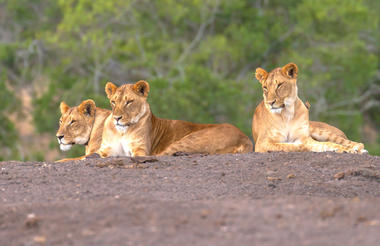
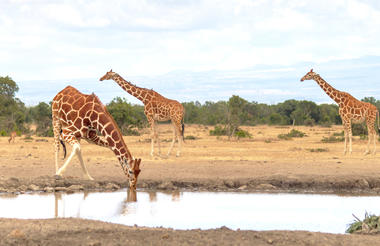
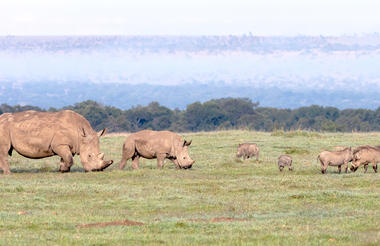
Transfers and scheduled flight
Accommodation
All meals, soft drinks, local beers and house wine
Game Drive
Visit Endangered Species Enclosure
Enjoy a morning game viewing drive in the conservancy.
Ol Pejeta Conservancy lies in Central Kenya’s Laikipia County, between the foothills of the Aberdares and Mount Kenya. Laikipia plateau has a varied landscape of stunning beauty. The high plains and low valleys are homes to some of the finest wildlife sanctuaries in the world, featuring some of the finest and luxurious accommodation facilities in the country.
Ol Pejeta is a private 90,000 acres wildlife conservancy and home to Kenya's largest population of Black Rhino, a large number of elephant, cheetah, lion, leopard and plains game, including the rarer game found in the north such as Grevys Zebra, Jacksons hartebeest and Beisa oryx, bat-eared fox and serval.
The more common African wildlife can, of course, be found here too, including giraffes, vervet monkeys, baboons, hippos, impala, eland, Grant’s gazelle, dik-dik, plains zebra, silver backed jackal, hyena. There are also over 300 bird species on the Conservancy.
All animals are free to move in and out of the Conservancy by way of specially constructed "game corridors" that only restrict the movement of rhinos. Knee-high posts in the ground, situated very close together, present no challenge for elephant, antelope and carnivores, who are easily able to jump or step over. Rhinos, however, are unable to do this, and as a result are restricted from moving into areas where they are in danger of being slaughtered for their horn.
There is a small Wildlife Educational Centre which is interesting for both children and adults alike and a Chimpanzee Sanctuary for orphaned chimps offers the opportunity to learn about the perils facing chimpanzees in the wild. The Sweetwaters Chimpanzee Sanctuary is incorporated within the Ol Pejeta Conservancy and is the only place in Kenya where this highly endangered and remarkably intelligent species can be seen.
The Sanctuary opened in 1993 in a negotiated agreement between the Ol Pejeta Conservancy, the Kenya Wildlife Service (KWS) and the Jane Goodall Institute. The facility was initially established to receive and provide lifelong refuge to orphaned and abused chimpanzees from west and central Africa. An initial group of three chimpanzee orphans were brought to the sanctuary from a facility in Bujumbura, Burundi, that needed to be evacuated due to the civil war. This was followed in 1995 by another group of 9 adult chimpanzees, and another 10 in 1996. Over the last decade Sweetwaters Chimpanzee Sanctuary has been compelled to keep accepting chimpanzees rescued from traumatic situations bringing the total number of chimpanzees in the sanctuary to 43.
At the Sweetwaters Sanctuary, chimpanzees are nursed back to health and enjoy the rest of their days in the safety of a vast natural enclosure. The chimpanzees live in two large groups separated by the Ewaso Nyiro River. Sweetwaters is a chartered member of the Pan African Sanctuary Alliance (PASA), an alliance of 18 sanctuaries in 12 African countries, currently caring for over 800 orphaned and/or confiscated chimpanzees. PASA’s role is to help conserve chimpanzees and other primates and their habitats through public education and lobbying for political goodwill.
After your morning game drive, you will be transferred to The Fairmont Mount Kenya Safari Club for lunch.
The Fairmont Mount Kenya Safari Club is set in over 100 acres of landscaped gardens, with magnificent views of majestic Mount Kenya. The club was once the retreat of movie star and Club founder, William Holden and members’ haven included Winston Churchill and Bing Crosby. The Club has been built right at the equator and its elegant buildings are set on beautifully manicured lawns with magnificent views of Mount Kenya. Guest rooms are spread out on the grounds of the Club and comprise rooms, Suites and Cottages. All rooms feature fire place, in room safe, a mini-bar and coffee / tea making facilities.
Later in the afternoon enjoy the game viewing drive back to the Ol Pejeta Conservancy arriving back at your camp.
Overnight: Serena Sweetwaters Serena Camp - Morani Wing

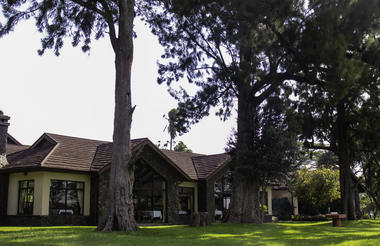
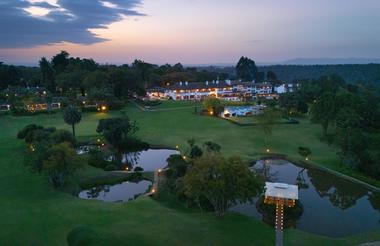
Accommodation
All meals, soft drinks, local beers and house wine
Transfers
Game drive through the Ol Pejeta Conservancy
Lunch at The Fairmont Mount Kenya Safari Club
Visit to Wildlife Educational Center
Visit Chimpanzee Sanctuary for orphaned chimps
16h00 visit to the Northern White Rhinos
After breakfast, drive to the semi-arid Samburu National Reserve, enjoying a short game viewing drive en-route to Elephant Bedroom Camp arriving in time for lunch.
Elephant Bedroom Camp is located at the banks of the Ewaso Nyiro River, sourrounded by doum palms and other indigenous trees. The camp is decorated in rustic African style, with vibrant colours which are popular with the local Samburu tribe. The tents are set on raised wooden decks where one can relax while enjoying the spectacular scenery and each deck has a private plunge pool facing the river which is regularly visited by elephants and other game.
The Samburu are a Nilotic people of north-central Kenya that are related to but distinct from the Maasai. The Samburu are semi-nomadic pastoralists who herd mainly cattle but also keep sheep, goats and camels. They live north of the equator and live in very diverse and beautiful landscapes that spans high altitude forests, open plains, semi-arid grass and bush land to complete desert. The name they use for themselves is Lokop or Loikop, a term which may have a variety of meanings which Samburu themselves do not agree on. Many assert that it refers to them as "owners of the land" ("lo" refers to ownership, "nkop" is land) though others present a very different interpretation of the term. The Samburu speak Samburu, which is a Nilo-Saharan language. There are many game parks in the area, one of the most well known is Samburu National Reserve.
The Samburu tribe, just like the Masai, has retained their traditional way of life and still practices their ancient customs.
After lunch relax before your late afternoon game drive until sunset.
Overnight: Elephant Bedroom Camp
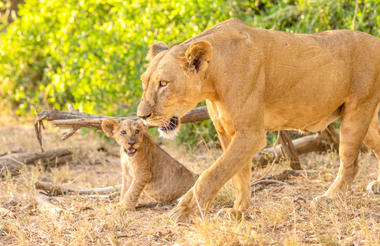
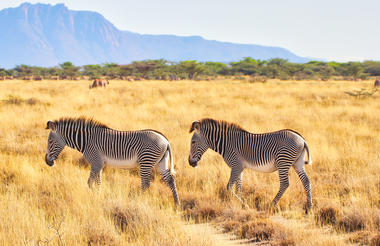
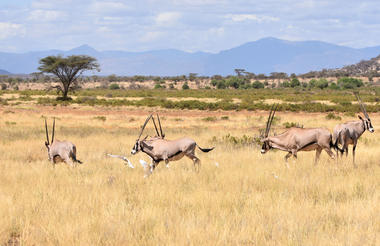
Accommodation
All meals, soft drinks, local beer and house wine
English speaking driver guide
Game drives
Spend another day game viewing in the Samburu National Reserve.
Search for rare game only found north of the equator, such as the reticulated Giraffe, Grevy’s Zebra, Beisa Oryx and Somali Ostrich. Samburu lies in the vast, hot and arid Northern Kenya and is adjacent to Buffalo Springs and Shaba National Reserves. The Ewaso Nyiro River is the lifeline for the people and animals in the area and crocodile share the banks with elephant, lion, buffalo and even the elusive leopard.
Overnight: Elephant Bedroom Camp.
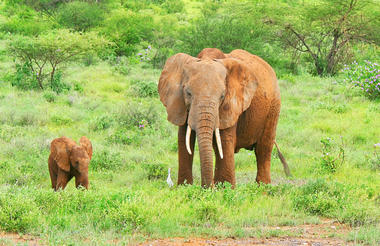
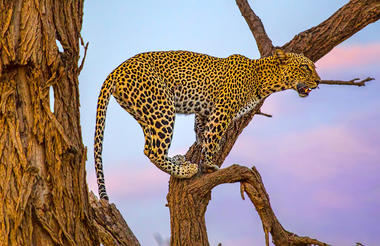
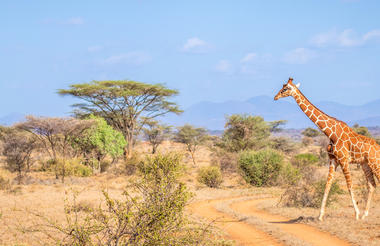
Accommodation
All meals
Game drives
After breakfast, you will be transferred to Nanyuki Airstrip for a scheduled flight to Masai Mara National Reserve. Flight departure is 10h05 arriving at 12h35.
On arrival at the airstrip, you will be met by a camp driver guide and transferred to Mara Ngenche Safari Camp, in time for lunch.
Mara Ngenche Safari Camp is located on the banks of the Mara and Talek Rivers, in the heart of the Masai Mara. The spacious guest tents are all en-suite with a bath tub and outside shower and decorated with a fusion of modern African decor. Each tent has a four poster king-sized bed with views of the Mara River and is partially enclosed in its own boma. The camps dining and lounge area have an open-sided design with views of the river where pods of hippo and crocodiles can often be seen relaxing on the banks.
Relax after lunch, before your afternoon game drive in the reserve on shared camp vehicle.
Return to the camp for dinner and enjoy and evening under the African sky.
Overnight: Mara Ngenche Safari Camp
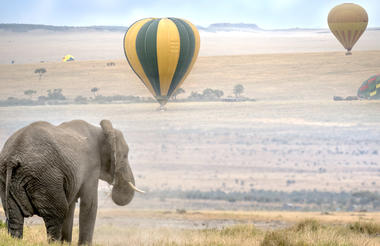
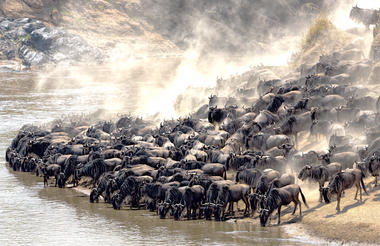
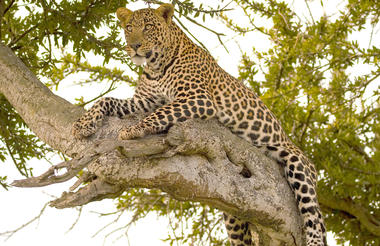
Mara Lion Project
Scheduled flight
Meet and greet by camp driver guide
Transfer to the camp
All meals, soft drinks, local beers and house wines
Afternoon game drive -camp driver guide
Experience a wonderful two more days game viewing in the Masai Mara.
The Masai Mara is one of Africa’s greatest wildlife reserves. Acacia dotted plains, tree lined rivers and woodlands are abundant with wildlife and an array of bird life. Game viewing is spectacular year round; you may see a pride of lions stalking their prey, observe a herd of elephant and their fascinating social structure, or see pods of hippo wallowing in the rivers.
The great wildebeest migration is one of nature’s wonders; an estimated two million animals migrate in a year round pattern through Tanzania and Kenya following the rain. From around July to October each year the grasslands of the Mara and Northern Serengeti are covered by a mass of moving wildebeest, offering easy opportunity for crocodile and predators that are never far away. However, this is an act of nature and movement of the animals may vary slightly from year to year.
In the evening there will be a talk on The Mara Lion Project. The project was started by the Kenya Wildlife Trust to try and ensure the future conservation of Kenya’s lions in the Greater Mara Ecosystem.
The African lion population has almost halved in the last three decades and continues to decline. In 1980 there were an estimated 75,000 lions, while today there are approximately 35,000 free ranging lions. The lion went extinct in 26 countries and now East Africa represents a crucial region for the lions’ persistence as it currently holds around 57% of Africa’s remaining lions.
On one of the days, you will visit to a traditional Maasai village for a cultural experience. The Maasai are proud pastoralists and warriors. Spend time in the “Manyatta” and immerse yourself in one of earth’s oldest cultures. The ladies and children will entertain with traditional songs and while at the village see how they go about their daily lives in a very traditional way, like making fire with sticks! You will also visit a nearby school. Spend time singing with the children, meet the teachers and learn about the school and also the challenges they face
The Maasai people of East Africa live in southern Kenya and northern Tanzania along the Great Rift Valley on semi-arid and arid lands. The Maasai occupy a total land area of 160,000 square kilometers with a population of approximately one half million people. However, many Maasai see the national census as government meddling and often miscount their numbers to census takers. The Maasai society is comprised of sixteen sections (known in Maasai as Iloshon)
The Maasai are a semi-nomadic people who lived under a communal land management system. The movement of livestock is based on seasonal rotation. Contrary to many claims, this communal land management system allows the use of resources in a sustainable manner. Each section manages its own territory. Under normal conditions, reserve pastures are fallowed and guarded by the warriors. However, if the dry season becomes especially harsh, sections boundaries are ignored and people graze animals throughout the land until the rainy season arrives. According to Maasai traditional land agreement, no one should be denied access to natural resources such as water and land.
The Maasai economy is increasingly dependent on the market economy. Livestock products are sold to other groups in Kenya for the purchase of beads, clothing and grains. Cows and goats are also sold for uniform and school fees for children. It is now common to see young Maasai men and women in major towns and cities of Kenya selling, not just goats and cows, but also beads, cell phones, charcoal, grain among other items. The entrepreneurial spirit is something new in the society.
Overnight: Mara Ngenche Safari Camp
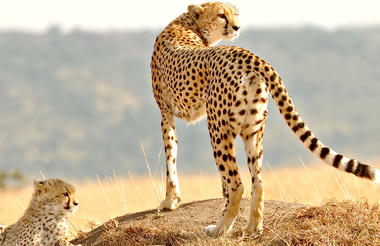
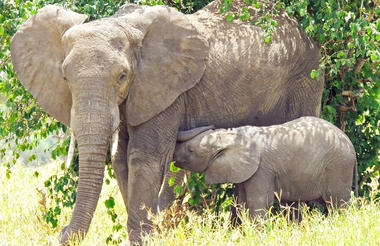
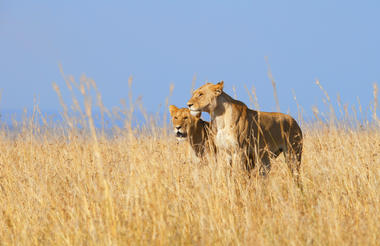
Visit to traditional Maasai village
Mara Lion Project
Accommodation
All meals and local drinks
Game drives
Talk on Mara Lion Project
Visit to the Maasai village - welcome ceremony: song and dance: school visit
Wake up to morning tea or coffee and head into the reserve on a morning game drive with your expert driver guide. Just as the sun is rising you’ll see the nocturnal animals just turning in and the grasslands come alive with wildlife beginning their day.
An optional activity in the Masai Mara, at additional cost, enjoy an early morning Hot Air Balloon Safari which includes a champagne breakfast served in the middle of the bush.
Late afternoon you will have the chance to venture out for another wildlife viewing encounter. Each game drive offers a different experience. The richness of the wildlife is breathtaking. A network of streams provides water for the elephant, buffalo, cheetah, leopard, lion, antelope, giraffe, zebra, wildebeest, hippo, and crocodile to live here in balance with the environment. You never know what you’ll see when you turn a corner.
Return to the camp for dinner.
Overnight: Mara Ngenche Safari Camp



Accommodation
All meals, local drinks
Game drives
After breakfast at the camp you transfer to the airstrip for your flight departure at 11h15 to Nairobi’s Wilson Airport - arrival at 13h00.
On arrival at Wilsons Airport you will be met by our representative and taken to Tamambo Karen Blixen Coffee Garden for a leisurely lunch.
Tamambo Karen Blixen Coffee Garden is located in a beautiful tranquil garden setting and offers a wide variety of dishes.
After lunch, you will be transferred to Eka Hotel where a day room has been reserved for you.
1640 Hrs:-Transfer to Jomo Kenyatta International Airport for your LX 294 (Swiss air 9764) flight departing at 1940Hrs



Breakfast at the camp
Transfer by camp driver to the airstrip
Meet and greet at Wilson's Airport
Transfer to Tamambo Karen Blixen Coffee Garden
Lunch
Transfer to Eka Hotel - Day Room
Transfer to Jomo Kenyatta International Airport



